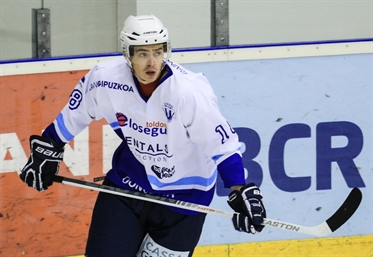Career change
Career change
Meet Continental Cup’s Mr Versatile

 Former Spanish national team goalie Luis Sokolov warms up as a forward during the IIHF Continental Cup tournament in Brasov. Photo: Daniel Milata
Former Spanish national team goalie Luis Sokolov warms up as a forward during the IIHF Continental Cup tournament in Brasov. Photo: Daniel Milata
Sokolov’s unorthodox switch is much down to the recruitment of long-term Spanish national team stalwart Ander Alcaine. Following the arrival of the former Ligue Magnus netminder to Spanish champion Txuri Urdin San Sebastian this summer, Sokolov decided to make the drastic move from guarding the net to instead attacking it.
“I’ve been a goalie ever since I’ve started with hockey at the age of nine, but as our Spanish national team goalie is in now in our team, it was not really an option to be a goalie this year, so I’ve decided to become a forward as I’ve always liked it and I have since been working hard to get a spot on the team,” said Sokolov.
He got on the ice for a single shift in Txuri Urdin San Sebastian’s tricky opener against DVTK Jegesmedvek Miskolc in Group C of the Continental Cup's second round. Despite a 0-5 reversal and his quick cameo appearance, it was a sign of progress for Sokolov, who so far has been getting very limited ice time for the Spanish champions.
“I did not get any playing time at all during the first few games in the Spanish championship, but more recently, I have managed to get a couple of shifts,” he said on his step-by-step development.
Having played his entire career in Txuri Urdin San Sebastian, Sokolov made his senior World Championship debut as a goaltender for Spain as a nervous 21-year-old at the 2012 IIHF Ice Hockey World Championship Division II Group A in Reykjavik, Iceland. Replacing Alcaine between the pipes with 9:43 left in the game, he played his part in shutting out New Zealand as Spain rolled to an emphatic 7-0 victory.
The following year he was back for more. With Alcaine temporarily out of the picture, Sokolov played his first full game in a narrow 4-3 loss to Serbia as Croatia’s capital of Zagreb hosted the 2013 IIHF Ice Hockey World Championship Division II Group A. Sharing goaltending duties throughout the tournament with Bruno Gonzalez, Sokolov featured in four of Spain’s matches.
“I loved it,” he said of his experiences in Zagreb where he played 131:02 minutes overall. “It is always great to play against good players, but it did not go as well as I had wanted to,” he said of a tournament where Spain ended up winless and was sent down to Division II Group B.
Born in the Belarusian capital Minsk in what was then the Soviet Union in 1990, Sokolov moved with his family to the Basque region of Spain at the age of two. The arrival to the Iberian peninsula meant partly a return to his family roots. At the end of the 1930s Sokolov’s grandmother had moved to the Soviet Union to seek refuge from the Spanish Civil War. It is an intriguing life story similar to that of one the finest players ever to grace the game. The eight-time world champion and two-time Olympic gold winner, the late Valeri Kharlamov, famously had a mother originally from Bilbao in the Basque region who also had been forced to flee to the Soviet Union from the ravages of war around that same time.
Following the disintegration of the Soviet Union and moving to San Sebastian, getting adjusted to their new life at the Bay of Biscay was for long a battle for Sokolov’s parents in their new environment.
“It has always been hard for my parents because they moved to Spain when they were already 25. Sometimes it has been hard for them to find work, but they have moved forward and now they have a good life,” he said.
Sokolov, who only holds a Spanish passport, speaks Russian, Spanish and Basque and still keeps in touch with his place of birth as most of his relatives from his mother’s side still live in what today is Belarus.
Txuri Urdin San Sebastian arrived at the Continental Cup’s second round in the Romanian city of Brasov well aware of that their three opponents, DVTK Jegesmedvek Miskolc, Corona Brasov and Crvena Zvezda Belgrade, were expected to be an uphill task for the reigning Spanish title holders.
“We came to have fun first of all. We know the other teams are better than us, at least on paper. But we tried really hard in our first game and that is what we will do for the rest of the tournament,” said Sokolov, who is hoping for more playing time in their two remaining games in the Continental Cup while trying to win over his sardonic teammates.
“So far it has been the comments which have so far been the hardest challenge,” he said on his switch from netminder to forward. “There is a lot of chirping and a lot of jokes from my teammates as they keep on telling me that I am really good although I only started to play,” he says as he is adamant to prove them wrong and refuses to throw in the towel.
“As from now on, I will play only forward,” he said. With the encouragement of his teammates and with plenty of tongue in cheek, he is not totally ruling himself out from a return to the Spanish national team in the future. All he needs to do now is to get up to speed and settle in his new role. “It will take around two years,” he said.
Back to Overview
















































